
A lovely Art Exhibition in Putney Library shows the imaginative work of Granard School pupils as they colour and paint their environment….
When you visit – please sign the visitor’s book …..
Exhibition open until 17th March.

Dates for your Diary

by admin

A lovely Art Exhibition in Putney Library shows the imaginative work of Granard School pupils as they colour and paint their environment….
When you visit – please sign the visitor’s book …..
Exhibition open until 17th March.
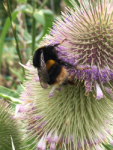
by admin
“We may be an urban constituency, but we have beehives in Putney and we know how essential bees are for pollination. I am very concerned about the decision to use bee-killing neonicotinoid pesticides. I firmly believe they should be banned.”
Fleur Anderson
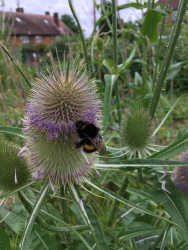

With all that’s happening you may not have noticed that the Government has agreed to allow the use of neocotinid pesticides this year – rolling back the EU legislation from 2018 banning these substances. Having just passed the Environment Bill, they then choose to set it aside.
A seed treatment to help sugar beet farmers sounds innocuous – until you understand that these extremely dangerous chemicals pass into every part of the plant -roots, stem, leaves, flowers -and persist in the soil afterwards, harming bees and pollinators for many years to come. They spread rapidly through water run-off contaminating wide areas. The science is devastatingly clear.
Research shows that neocotinoids also harm birds. Just two treated seeds (equivalent) eaten by a songbird makes them lose weight and delays migration, decreasing their chances of survival. (Science 2019)
Our President, Fleur Anderson, spoke in a parliamentary debate about this regrettable decision. See a clip of her speech here.
The Hansard record makes fascinating reading for those interested in this topic. Read the whole debate here: https://hansard.parliament.uk/
The virus disease problems experienced by our sugar beet farmers are real enough. The Government themselves have said that they expect the sugar beet industry to no longer rely on bee-killing neonicotinoids by 2023—next year—through the development of pest-resistant varieties and greater use of integrated pest management. Many farmers are working hard on alternative strategies. Sufficient support for the farmers to use alternative pest management could make this year’s devastation unnecessary.
Please be careful what you use on your plot. Our allotments should be a haven for our pollinators. This is a complex topic, but it has been shown that well diluted ionic surfactants (eco washing up liquid) are mostly harmless. Glyphosate is not. Try not to use it – it’s persistent in the soil. If it’s essential to use a tiny amount make sure the bees can’t get to it. ( Non-insecticide pesticide impacts on bees: A review of methods and reported outcomes/ Agriculture, ecosystems & Environment, 2021)
Read Fleur’s newsletter about this and other local issues here

by admin
The RGS Allotments are, in general, set on London Clay. This heavy soil has some challenges for cultivation. Success revolves around good nutrients and, importantly, good drainage.
In general you don’t dig a clay soil in January – the autumn is better, when the soil is relatively dry. If wet in Winter it’s best not to walk on the soil until it dries out a little, usually in mid-Spring.
You may find it easier to use a Digging Fork – not a spade…. Read why here
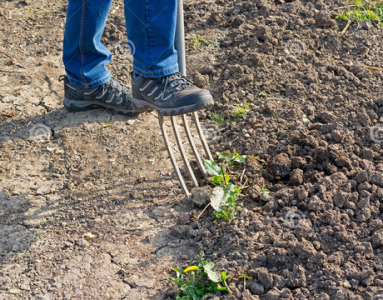
Getting the best out of a clay soil…. Quick facts from the RHS
Clay soils contain more than 30 percent fine clay particles
Clays swell and shrink as they wet and dry, effectively cultivating themselves
Clay soils take longer to warm up in spring
Wet clay soils are easily damaged when dug or walked on
Drought is much less damaging on clay soils than others soil types
Five steps to improving clay soils:
The links in this list lead to further advice from the RHS.

by admin
It isn’t a glamorous job – but, before the weather warms up, take the opportunity to have the ultimate spring clean..
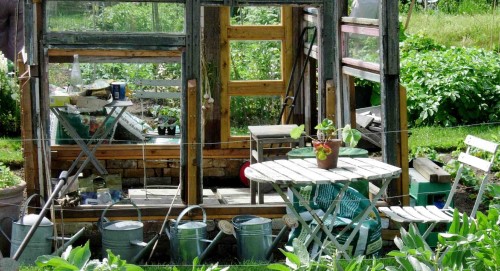
Removing algae, moss and grime lets in more light and helps reduce pests and diseases – says the RHS.
SO – here’s a quick checklist – but the full advice is worth reading.
Find the full advice from the RHS HERE
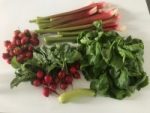
by admin
Two press articles recently report on a two year pilot study which suggests that allotments could be as productive as conventional farms. Volunteer urban growers in Brighton and Hove were able to harvest 1kg of insect-pollinated fruit and vegetables per sq metre in a season! (wishful thinking on my allotment…. – ed)
Read the full article from the Guardian here
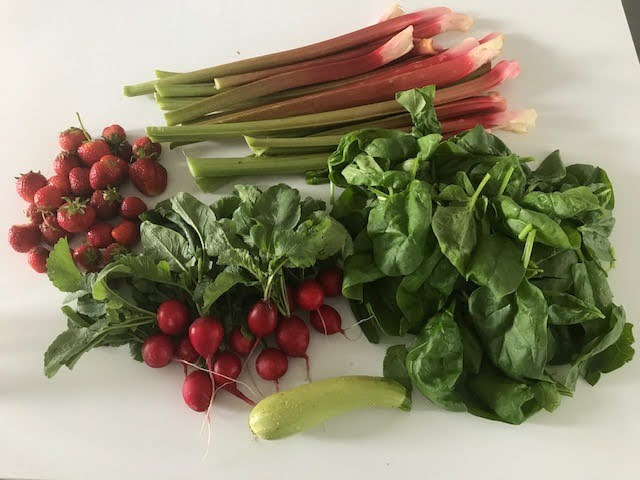
The Times reports that the average allotment owner harvested 74kg over a season, which would have been sold for about £380 in the shops. The most productive gathered in food worth more £2,000, with raspberries and gooseberries among the most expensive crops… Link for subscribers only
The Guradian report says ” The project, which analysed the yields of 34 “citizen scientists” growing fruit and vegetables on their allotments, gardens and balconies, found that despite limited pesticide use they were each able to grow an average of £550 worth of produce between March and October.
Of the total figure, £380 of it was from insect-pollinated produce – such as squash, courgettes, blackberries, tomatoes, apples and beans – weighing an average of 70kg.
Berries were the most attractive crop to pollinators, the study found.
Across the two-year period, volunteers recorded more than 2,000 pollinating insects among their crops. The most common were bees, which accounted for 43% of all flower visits.
AND – the growers used less pesticides than conventional farming techniques – they were used in under 10% of pest cases – and that the most common pests were slugs, snails and aphids. The worst-affected produce was soft fruit and beans.
“The UK imports approximately £8bn of fruit and vegetables each year, but our results show that green spaces in cities, such as allotments and community gardens, could play an important role in meeting that demand at a local scale.”
The Guardian Dec 2021
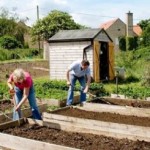
by admin
It’s official: allotments are good for you – and for your mental health. The Scientists have been at work again – but at least they confirm what most of us already know…..“Tending your own patch boosts wellbeing and connects you with others”.
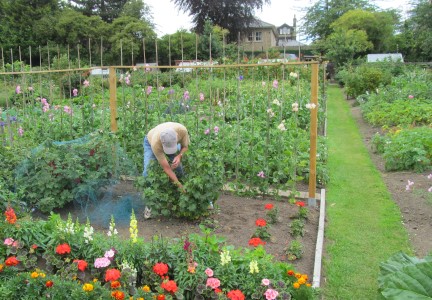
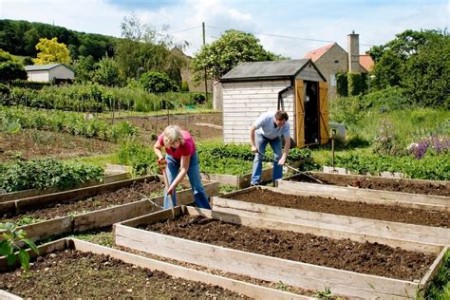
A study by academics at the University of Sheffield, published last November, outlines the wellbeing benefits of allotment gardening. The 163 volunteers recorded “high levels of social and community activities, including the sharing of surplus food produce, knowledge exchange, awareness and interaction with wildlife, emotional connection to their allotment, appreciation of time spent outside and aesthetic delight in the natural world”.
Read the full article here
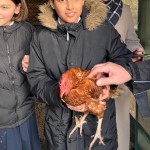
by admin
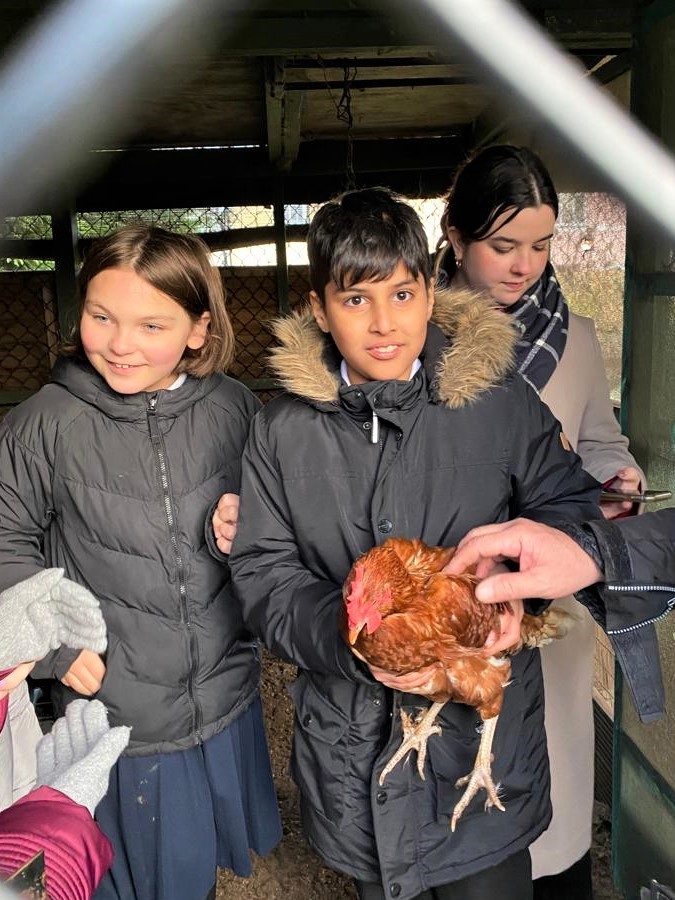
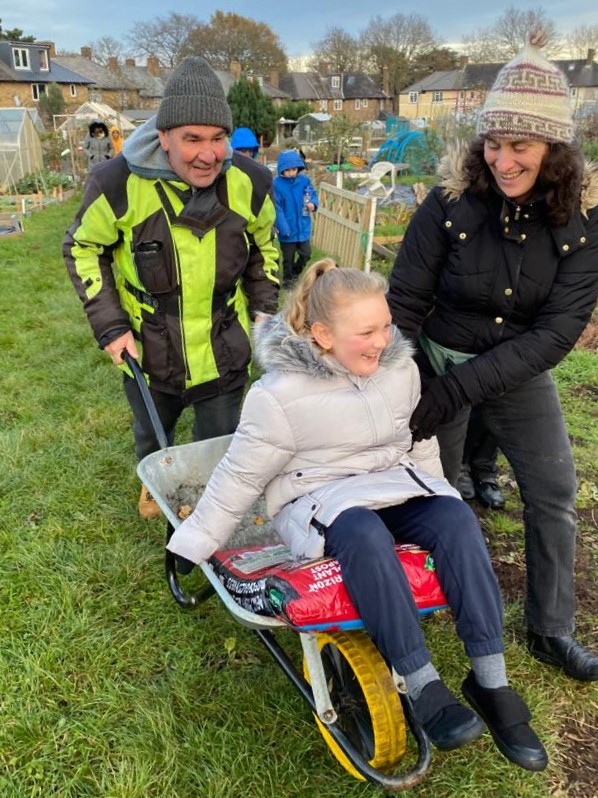
One Monday afternoon in December, when a small group of Granard school children were visiting the Site 2 allotments, Barry was kind enough to introduce them to his chickens. As you can see they were able to hold them and Barry gave the school a dozen fresh eggs which were cooked the following morning. After they had visited the chickens Barry gave a few of the children a ride in a wheelbarrow, ably helped by one of their teachers, Natalya, who is also a plot holder.

by admin
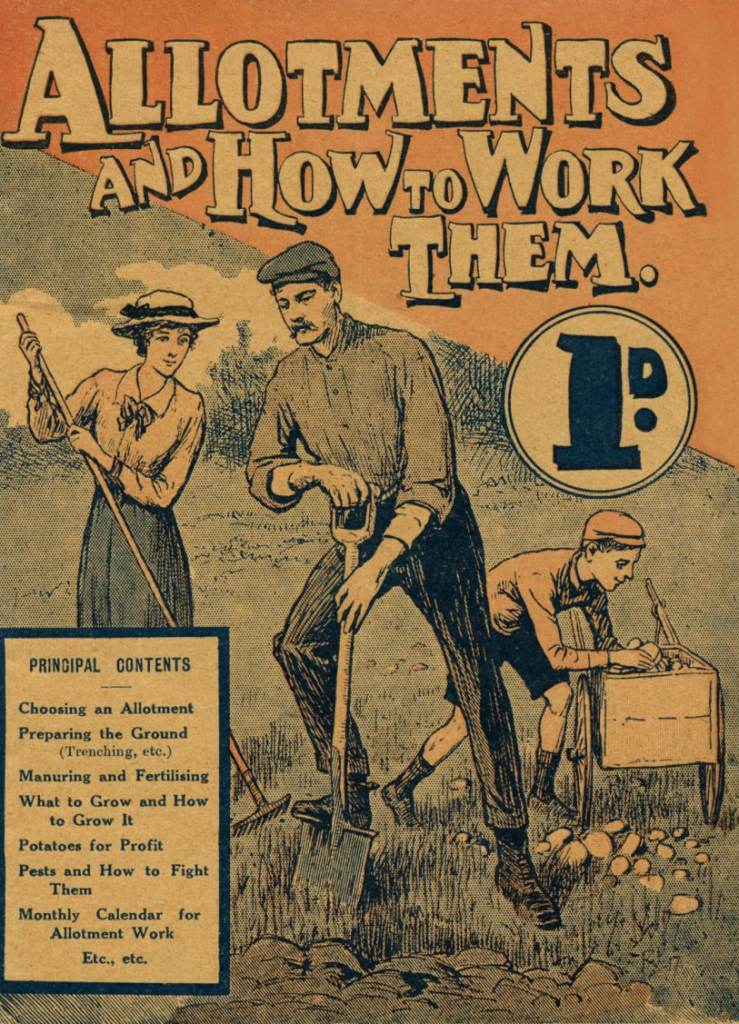
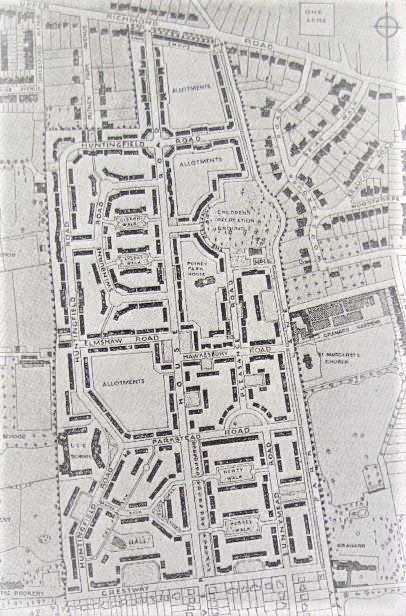
Growing and cultivating never go out of style…..
Throughout 2022 we will be looking at ways to celebrate our centenary. Our allotments were part of the original design for the Doverhouse Estate. You will note that there were 3 areas marked as allotments in the plan. Unfortunately the northernmost and largest site, to the north of Huntingfield Road, was later used for development.
by admin
Tom Murphy 1942-2021
Just before Christmas we heard of the sudden death of one of our long standing members. Tom Murphy was a well loved character and a friend to many neighbours on site 3. He had been an allotmenteer for over 35 years and would always share advice on growing things. He still used very traditional methods to grow his produce – usually potatoes (double dug and deep trenched) and wonderful cabbages. He cut the grass on the common paths on both allotment sites for many years, fetching petrol for the mower on the bus and walking the mower between sites!
We will miss him.
Bill Young writes this memoir:
We will all remember Tom with some affection. Tom always had a ready smile and a mischievous twinkle in his eye. Even gardening, he was always smartly suited and booted. Several people who were Tom’s immediate neighbours on the allotment, all have their own versions of the following story:
One hot summers day in 2014 – Tom appeared on his allotment dressed as was usual, in a suit, collar and tie. From his shed he produced a coat hanger, then proceed to hang his jacket on that. As the sun was glaring down on him in his shirtsleeves, he started a rummage within his shed, finally he produced a sun-hat. The Australians have a wide brimmed bush hat, complete with dangling corks all along the brim – to ward off the flies. Tom had his own, the Murphy version! Emblazoned on the crown it said GUINNESS, on the brim, numerous small plastic Guinness bottles dangled – to ward off flies. To cap it all, in a fine tenor voice whilst hoeing – he serenaded everyone with the following :- “Old Man River”, “Mississippi Queen” . Capping it off with Johnny Cash’s “I walk the Line” “Folsom Prison Blues” and finally “Ring of Fire”
Post nubila Phoebus
Bill Young 24/12/21
by admin
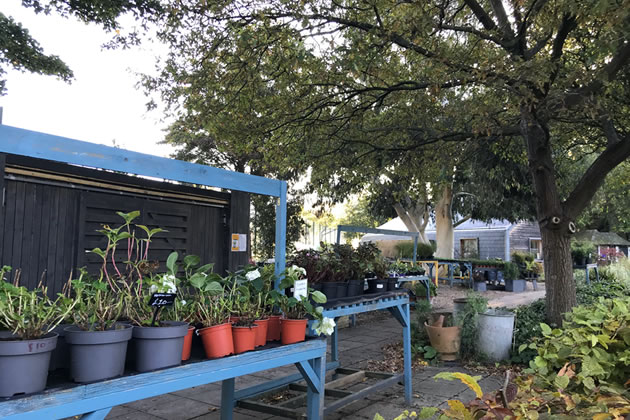
The gardening-for-health charity Thrive is looking for local volunteers.
Thrive’s London hub is based in Battersea Park and throughout the pandemic has continued to help locals – either virtually or in-person, when restrictions have allowed – use gardening for health and well-being. Their plants are often found on sale in their outdoor garden centre.
They are looking for Garden Support Volunteers to “assist the client gardeners and horticultural therapists”. You will need to commit to one day a week, from 9.45am-3.15pm, for at least six months. Volunteers need to be patient and understanding, whilst respecting professional boundaries, and be prepared to work outdoors in all weathers.
If you could consider taking on this worthwhile opportunity, read more here
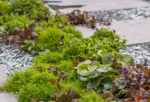
by admin
The RHS have launched a Sustainability Policy to help gardeners make a contribution to tackling our climate crisis.
What we all do on a small scale can make a difference. The RHS say….
We all have a responsibility to help mitigate the climate and biodiversity crisis. As gardeners, we’re perfectly placed to support our environment through sustainable growing. Many of us are already planet-friendly gardeners, but there’s always more we can do or help to spread the word across our communities.
RHS Communities
To coincide with our new Sustainability Strategy, we’ve put together ten easy tasks that all gardeners can complete to support their local environment. From watering the way nature intended, to making your own compost or growing your own flowers for bouquets – each and every one of us can make a difference in the climate crisis.
Many of these suggestions are already in evidence on our allotments, but here’s one you may be interested in and could encourage others to do…

Here’s an inspiring set of ideas for Front Gardens….Read Now
And here are all the 10 suggestions ….Read Now
by admin
12th November, St. Margaret’s Church, Putney Park Lane.
7.00pm welcome drinks and snacks, 7.30pm business meeting 8.15pm prizegiving, 8.30pm refreshments
After last year’s online style AGM we are delighted to be meeting in person this year.
Committee Nominations for 2021/22 are here. There is still time to join the committee – please email rgs.sw15@gmail.com or telephone Helen at the number on the Nominations document.
Full agenda and reports for members from the committee are listed below. Please read them and bring your questions and comments to the AGM.
1. Apologies.
2. Papers from distance AGM 2020
3. Chair’s report– included amendment in the document ‘Offering Plots to let’ for approval by the membership:
4. Treasurer’s report and Accounts
5. Other Committee papers: from Site Secretaries, Trading Secretary, Show Chair, Waiting list Secretaries. These available on website only.
6. Questions from the floor
7. Election of Committee 2021/22
8. Any Other Business
9. Presentation of Cups
10. Refreshments
For more details and reports please see the special AGM page here